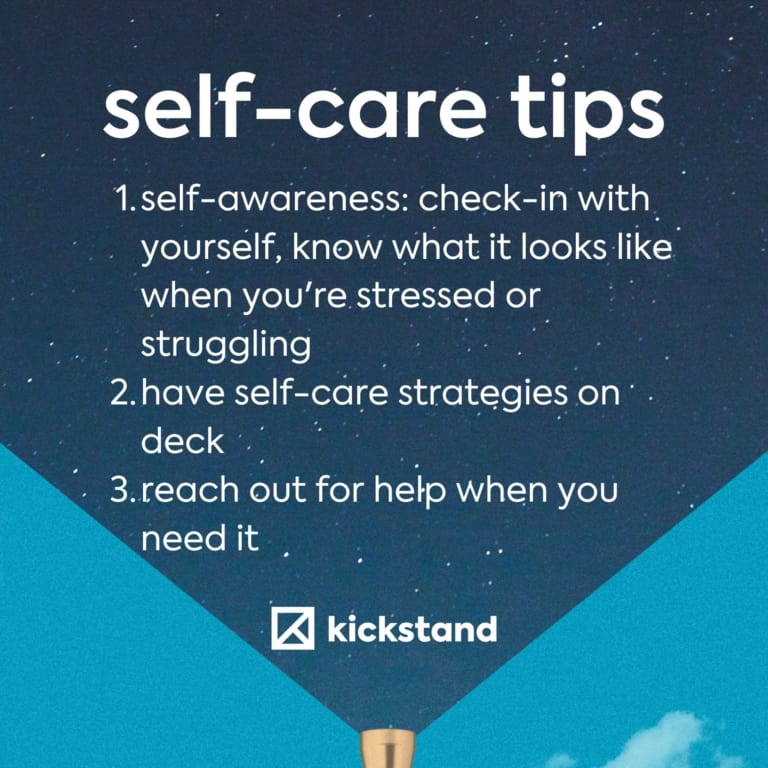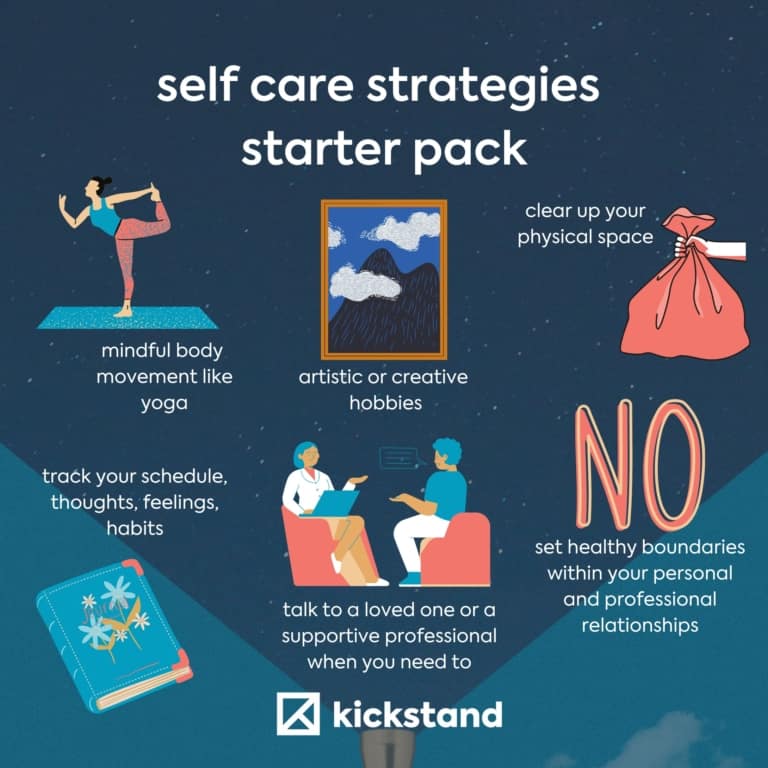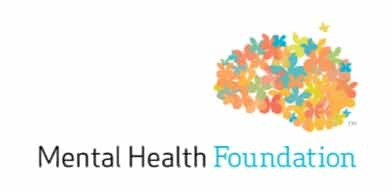Taking care of yourself is an important part of having a happy and healthy life. Many people think that self-care is about taking a bubble bath or doing a face mask. Though it can include relaxation techniques like this, self-care is actually much more than that. When taking care of your mental health, you should keep in mind the importance of self-awareness, the many kinds of self-care practices, and seeking help when we need it.
Self-Awareness
Self-awareness allows you to check-in and determine if you are doing what you need to in order to feel mental wellness, while considering what feeling unwell looks like for you. This is especially crucial when you get busy balancing school, work, friends, family, relationships and more! Get into the habit of asking yourself questions like:
- What does it look like if I’m feeling well or unwell? When I’m not doing well, what changes do I notice in my thoughts, feelings and behaviour?
- What helps fill me back up if I’m low? What helps recharge my batteries?
- Am I practicing self-compassion? Am I being harder on myself than I am on others? If my best friend was going through what I’m going through, would I treat them the way I’m treating myself right now?
Your answers to these questions will change as you transition through life, so remember to regularly check in with yourself. It’s also a great idea to let a friend, family member or significant other know the answers to these questions, so they know what it looks like when you need to recharge and re-calibrate. If they know how to spot when you’re feeling unwell and know what you need from them, then they are better able to support you!
Check out this Self-Care & Self-Awareness Guide to help get started.


Self-Care Strategies
Alright, so now that you’re on the path to knowing yourself and being kinder to yourself, let’s talk self-care strategies. What are they? They are activities that not only help us relax and de-stress, but actively build up our self-esteem and resilience in handling tough situations. Most importantly, self-care looks different for everyone. Perhaps going for a walk or having a self-made spa day works for some people, but you may need something totally different. As well, self-care strategies change and evolve as you grow and experience new things.
Many don’t realize that self-care strategies include engaging in activities that are good for building up self-esteem. Building up your self-esteem is important to our mental health and what makes you feel good. These activities should give you a sense of competence, control, and belonging. You may have heard of physical and artistic activities like hitting the gym, signing up for a yoga class or joining a paint night. However, things like developing organizational habits, making social connections and setting healthy routines are effective as well.
Organizational habits include making to-do lists, bullet journaling, or using alarms or reminders on your phone to make sure you stay on track and refrain from overbooking yourself. Ever noticed how in control you feel after noting down all your upcoming bills, meetings, exams, papers, and assignments in your agenda? Or, what about how much clearer your brain feels when you are able to clean up your room or workspace? BOOM. Self-care!
Maintaining social connections like staying in touch with friends or joining a student group on campus also increases your sense of belonging. Check out what options you have for school clubs or make a new one! Use social media to search for virtual opportunities that align with your values or interests to help you meet like-minded folks.
When it comes to self-care, you can’t leave out healthy routines. You may not love to hear it, but for young people – sleeping enough and eating well is mandatory. As well, doing things like folding your laundry, cleaning up your living space, doing dishes, and brushing your teeth are all super important parts of self-care.
You may see friends pulling all-nighters, depending on too much caffeine, or forgetting to eat while working or studying too hard. This is really unsafe for our mental health and it does not guarantee getting a good grade or finishing a task on time.
Re-organize your priorities and make space for at least 6 hours of sleep a night and 3 meals a day. You’ll find you have a much better chance at being productive and being able to do the things you want to do – whether it’s get good grades, do meaningful work, or volunteering. Good mental health “hygiene” is most certainly connected to good physical and emotional health.
Reach Out For Help When You Need It
The third part of taking care of yourself is recognizing that when you aren’t doing well despite your best self-care efforts, you should reach out and talk to someone. Let’s say you find that even after using your self-care strategies and talking to friends, you are still unable to do the things you want or need to do. Then, you might need a bit more support in the form of mental health services.
Check out this page for more information on free youth mental health services that you or a loved one can access through our virtual clinic, Kickstand Connect.
No problem is too small – if it’s negatively affecting your wellness then talking to someone can make a world of difference. It’s not lame, weak, selfish, or a waste of time to properly invest time and effort into self-care. In fact, it’s the complete opposite. Not only will your loved ones rest easy knowing that you know what to do to take care of yourself, but you will also become more resilient and successful too!
Take care, everyone!



